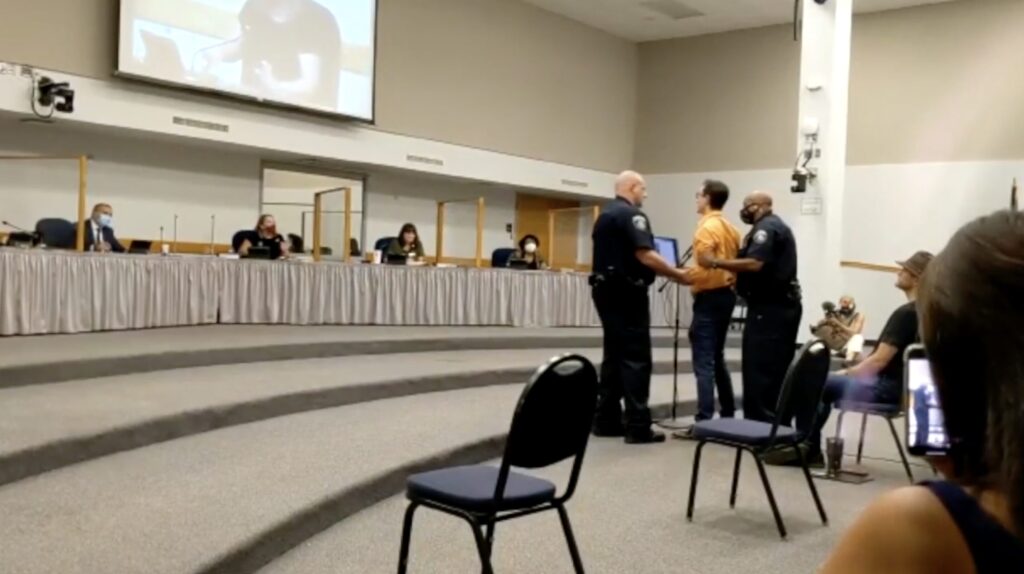‘Abuse of power’: Texas dad suing for retaliatory arrest reveals new evidence of corruption
(The Daily Signal) – Jeremy Story, a dad in the Austin, Texas, area, who is suing his local school board and superintendent after police arrested him for speaking out at a board meeting in 2021,…

(The Daily Signal) – Jeremy Story, a dad in the Austin, Texas, area, who is suing his local school board and superintendent after police arrested him for speaking out at a board meeting in 2021, has uncovered what he claims to be more evidence that bolsters his case.
Round Rock Independent School District has its own police force, and school district police removed Story after he spoke at a school board meeting, raising concerns about the school superintendent facing allegations that the superintendent had assaulted and threatened a former girlfriend. Police later arrested Story on charges of hindering proceedings by disorderly conduct—though after he was released, he never faced formal charges.
According to records Story obtained via the Texas Public Information Act, Superintendent Hafedh Azaiez hired two leaders of the school district police force despite failing to go through the proper appointment process.
The Texas Commission on Law Enforcement sent Azaiez a letter on Dec. 20, 2023, noting that he had hired Chief of Police Dennis Weiner and Assistant Chief of Police Rosemarie White without completing the full review of personnel files and other employee records. The school district had not completed a background check for White before hiring her, the commission stated.
Story claims the district never went through the full process to obtain licenses for Weiner and White.
“The uncovering of these licensing violations and the superintendent’s … malfeasance demonstrates a clear abuse of power,” Story told The Daily Signal in a statement Tuesday. “This lawsuit is not just about my wrongful arrest. It is about protecting the constitutional rights of all parents and community members. We must hold school boards and our public officials accountable.”
“America must never become a banana republic, where district attorneys, politicians, and government bureaucrats use the criminal justice system to persecute and silence those who expose or disagree with them,” he added.
Story also cited two other incidents involving the school district’s police department.
Last month, Weiner parted ways with the Round Rock Independent School District and submitted a letter to Azaiez. In that letter, he alleges that the school district failed to notify police when a student suffered a sexual assault on April 12. Weiner’s letter points to broader concerns with Azaiez’s leadership of the school district police department.
“Since joining the Round Rock ISD …, I have experienced numerous practices of non-reporting and delayed reporting of crimes, and interference with police operations and investigations by district staff,” he writes, noting his suspicion that Azaiez himself might be responsible.
Story also highlighted a report into the “culture and climate” of the Round Rock ISD police department, which Story received in April via a public records request after appealing to the Texas Attorney General’s Office.
The report, conducted by Patricia Linares at the school board’s request and resolved on Sept. 22, 2023, found that “the culture and climate are extremely negative, and there is little to no cohesiveness in the department.” The report found that staff had a “prevalent sense of favoritism” among leadership, a “fear of retaliation if someone disagrees with leadership,” and a sense that “they have ‘no voice.’”
The report found that claims of “willful misconduct” on the part of Weiner had been “substantiated.”
Story told The Daily Signal that these scandals bolster his case against Azaiez.
“It establishes a trend of the administration, specifically Azaiez and other top administrators, interfering with and using the police force,” he said. “It refutes [the school district’s] claim in our case that their police department has no systemic or organizational cultural issues and thus my incident was just a one-time ‘mistake’ they can’t be held accountable for.”
“It shows when it suits Azaiez’s purposes he is willing to ignore requirements and look the other way,” Story added.
Anne Drabicky, chief of public affairs and communications at the school district, declined to respond to concerns about the “culture and climate” report and also declined to comment on Story’s claims regarding the lawsuit. She did, however, dispute Weiner’s claim that he experienced non-reporting and delayed reporting of crimes, and interference with police operations.
“This is inaccurate,” Drabicky told The Daily Signal.
Mary Nix, a lawyer who represents Azaiez, did not immediately respond to The Daily Signal’s request for comment.
What Happened to This Texas Dad?
The case dates back to Sept. 17, 2021, when police arrested Story on a misdemeanor charge of hindering proceedings by disorderly conduct. That charge related to Aug. 16, 2021, when Story raised concerns at a school board meeting about Azaiez, who at the time faced allegations of family violence in an application for a protective order sought by a former girlfriend against him (redacted version available here).
According to publicly available footage of the meeting, Amy Weir, then president of the Round Rock Independent School District Board of Trustees, warned Story not to speak about “something other than” items on the meeting’s agenda.
Story responded: “I will show you how what I’m about to comment on is related to that.”
Weir twice interrupted Story, saying, “No, I do not want you to demonstrate.” However, she agreed to let him speak. Yet as soon as Story said, “Our superintendent has a protective order,” Weir nodded to Round Rock school district police officers, who escorted Story out of the building.
Story argues that Weir was intending to silence him. Weir categorically denied that claim.
Weir told Fox News, “There has never been an attempt to silence Mr. Story.” Following normal procedure, she said, Story wrote on a card indicating what he would say in the meeting, and he wrote that “unlike the board, citizens are not required to speak on items on the agenda,” indicating that “he was planning to speak on a topic not listed for the meeting.”
Story filed a grievance with the school board on Sept. 4, 2021. The board noted it as “filed” on Sept. 16, the day before police arrested Story. The board rejected the claim more than a year later.
In a Sept. 14, 2021, school board meeting, the district set up 18 chairs in a room that accommodated 300 people and prevented members of the public from entering. The school board passed a tax increase at that meeting.
Police prevented Story from entering that school board meeting. According to Story, the school district police forcibly held him back and injured him.
The Lawsuit
Story filed a lawsuit against Azaiez, the district, five of the seven trustees on the school board, and police officers. Last July, U.S. District Judge David Alan Ezra upheld many of Story’s claims, allowing his lawsuit to proceed.
Ezra rejected motions to dismiss claims that the school board violated Story’s First Amendment rights by limiting seating capacity in one school board meeting, by retaliating against him for engaging in constitutionally protected speech, and by barring him from a meeting that was open to public participation.
The judge also upheld Story’s claim that police violated his Fourth Amendment rights against unreasonable seizure and false arrest. He upheld Story’s claim that the school board president violated his right to equal protection of law under the 14th Amendment, and that school officials violated the Texas Open Meetings Act.
The Protective Order
Story referenced a “protective order” to discuss the claims of a woman who identified herself as Azaiez’s girlfriend from September 2018 to December 2020 and then from February to June 2021. In her application for a protective order, the woman claimed that when she told Azaiez that she was pregnant with his child, he demanded that she get an abortion. When she refused, she said, he assaulted her in her home, which put her in danger of miscarrying.
The woman also claimed that she overheard Azaiez “plotting” with Weir about hiding certain things from other school board members.
In a text message chain about the situation included in the application for the protective order, Azaiez wrote: “For the last time, I am telling you, please get an abortion; you don’t know what you are getting yourself into. I will make you pay this; you will not make me lose everything. … Don’t make me go after you and make you pay the consequences for you and this baby.”
Nix, the lawyer representing Azaiez, noted that “all applications for protective orders, including the one to which you refer, contain ‘allegations’ which are unproven and are not ‘facts.’”
The school board temporarily suspended Azaiez in 2022 amid a Texas Education Association investigation into the family violence allegations. Investigator Ann Dixon wrote an independent report into Azaiez.
Dixon previously told The Daily Signal she stood by her findings and her conclusion, which noted “the divisiveness created in the community by Dr. Azaiez’s behavior and the lack of Dr. Azaiez to be forthcoming” in stating that, in her opinion, he “could not come back into his position and be effective.”
Even so, he remains the superintendent since his reinstatement in March 2022.
What’s Next?
Story told The Daily Signal that Ezra referenced a recent Supreme Court decision in the last hearing regarding Story’s case. In Gonzalez v. Trevino, the Supreme Court unanimously ruled that Sylvia Gonzalez, a Texas city council member, could sue for retaliatory arrest after authorities arrested her on what she called a “sham charge” in apparent retaliation for gathering signatures to remove the city manager.
A lower court ruled that Gonzalez could not sue for retaliatory arrest because authorities had probable cause to suspect she had violated the law. The Supreme Court ruled that the existence of probable cause does not by itself invalidate a legal claim involving retaliatory arrest.
According to Story, Ezra “expressed a desire to expedite proceedings,” noting the Gonzalez v. Trevino case. Story said that ruling “supports claims of retaliatory arrest even when probable cause exists.”
“This ruling is pivotal for Story’s case, reinforcing the protection of free speech and Fourth Amendment rights against retaliatory actions by government officials,” Story wrote in a news release.
It remains unclear when the case will proceed to trial.



